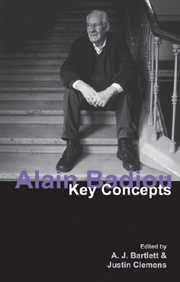Book contents
- Frontmatter
- Contents
- Contributors
- Acknowledgements
- Abbreviations
- Miscellaneous Frontmatter
- Introduction: Badiou's form
- 1 Biography and early works
- PART I THE FOUNDATIONS OF BADIOU'S THOUGHT
- 2 Philosophy
- 3 The conditions
- 4 The subject
- 5 Ontology
- PART II BADIOU'S KEY CONCEPTS OR “CONDITIONS”
- PART III BADIOU'S ENGAGEMENT WITH KEY PHILOSOPHERS
- Afterword: Badiou's futures
- Bibliography
- Index
5 - Ontology
from PART I - THE FOUNDATIONS OF BADIOU'S THOUGHT
- Frontmatter
- Contents
- Contributors
- Acknowledgements
- Abbreviations
- Miscellaneous Frontmatter
- Introduction: Badiou's form
- 1 Biography and early works
- PART I THE FOUNDATIONS OF BADIOU'S THOUGHT
- 2 Philosophy
- 3 The conditions
- 4 The subject
- 5 Ontology
- PART II BADIOU'S KEY CONCEPTS OR “CONDITIONS”
- PART III BADIOU'S ENGAGEMENT WITH KEY PHILOSOPHERS
- Afterword: Badiou's futures
- Bibliography
- Index
Summary
Mathematization alone reaches a real.
(Lacan 1998: 131)Fundamental to Badiou's later philosophy is his declaration in Being and Event that “mathematics is ontology”. Everything that follows from this assertion – from the structure of situations and their states all the way to events and the subjects and truths they can engender – must be understood as the carefully drawn-out consequences of this properly philosophical decision. One could even argue – such is the rigour with which Badiou constructs Being and Event – that those who reject Badiou's core philosophy do so foremost because they reject his initial thesis on the equivalence of mathematics and ontology. For if this thesis is unfounded, so too is Badiou's entire philosophy. Conversely, in accepting the equivalence of mathematics and ontology it is hard to avoid its manifold ramifications, meticulously laid out in Being and Event and subsequent works.
That ontology – which, since Aristotle, designates the science of being qua being – is mathematics in no way means that being is mathematical. Mathematics rather figures the discourse on being. Or again, “mathematics, throughout the entirety of its historical becoming, pronounces what is expressible of being qua being” (BE 2). It is for this reason that Badiou holds philosophy proper to begin with the Greeks, “because it is there that ontology established, with the first deductive mathematics, the necessary form of its discourse” (BE 10). It is however only today – which is to say, after Cantor's invention of set theory and its subsequent axiomatization by Zermelo, Fraenkel and others – that we can truly know this (TO 40–41).
- Type
- Chapter
- Information
- Alain BadiouKey Concepts, pp. 48 - 58Publisher: Acumen PublishingPrint publication year: 2010
- 2
- Cited by



